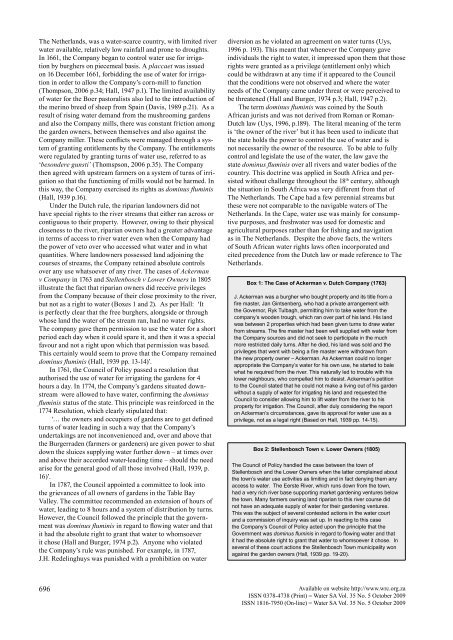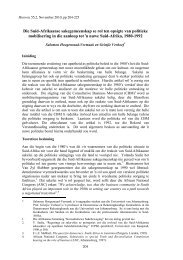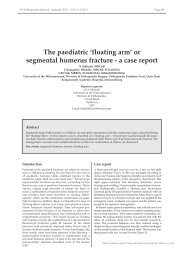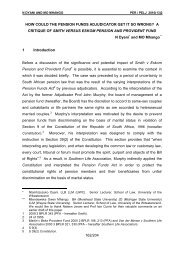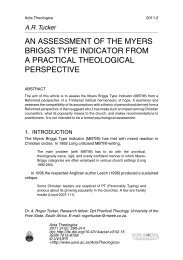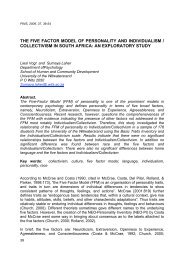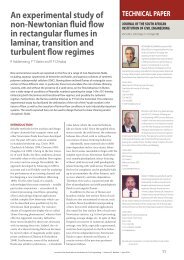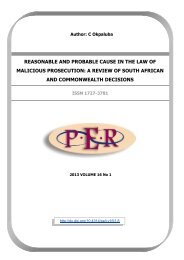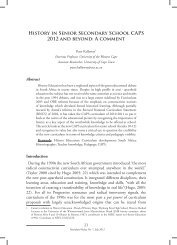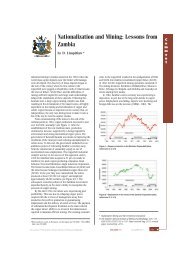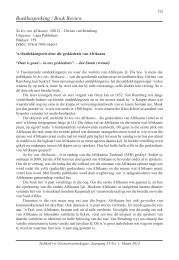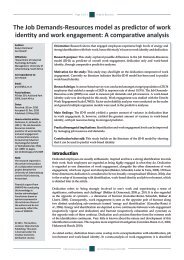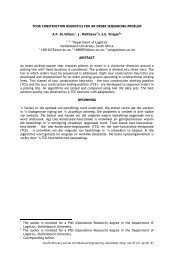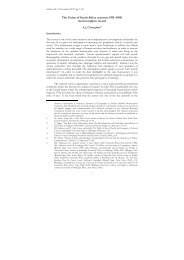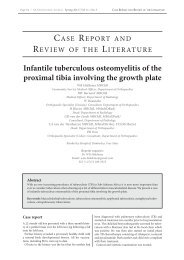A detailed analysis of evolution of water rights in South Africa: An ...
A detailed analysis of evolution of water rights in South Africa: An ...
A detailed analysis of evolution of water rights in South Africa: An ...
You also want an ePaper? Increase the reach of your titles
YUMPU automatically turns print PDFs into web optimized ePapers that Google loves.
The Netherlands, was a <strong>water</strong>-scarce country, with limited river<br />
<strong>water</strong> available, relatively low ra<strong>in</strong>fall and prone to droughts.<br />
In 1661, the Company began to control <strong>water</strong> use for irrigation<br />
by burghers on piecemeal basis. A placcaet was issued<br />
on 16 December 1661, forbidd<strong>in</strong>g the use <strong>of</strong> <strong>water</strong> for irrigation<br />
<strong>in</strong> order to allow the Company’s corn-mill to function<br />
(Thompson, 2006 p.34; Hall, 1947 p.1). The limited availability<br />
<strong>of</strong> <strong>water</strong> for the Boer pastoralists also led to the <strong>in</strong>troduction <strong>of</strong><br />
the mer<strong>in</strong>o breed <strong>of</strong> sheep from Spa<strong>in</strong> (Davis, 1989 p.21). As a<br />
result <strong>of</strong> ris<strong>in</strong>g <strong>water</strong> demand from the mushroom<strong>in</strong>g gardens<br />
and also the Company mills, there was constant friction among<br />
the garden owners, between themselves and also aga<strong>in</strong>st the<br />
Company miller. These conflicts were managed through a system<br />
<strong>of</strong> grant<strong>in</strong>g entitlements by the Company. The entitlements<br />
were regulated by grant<strong>in</strong>g turns <strong>of</strong> <strong>water</strong> use, referred to as<br />
‘besondere gunsti’ (Thomspson, 2006 p.35). The Company<br />
then agreed with upstream farmers on a system <strong>of</strong> turns <strong>of</strong> irrigation<br />
so that the function<strong>in</strong>g <strong>of</strong> mills would not be harmed. In<br />
this way, the Company exercised its <strong>rights</strong> as dom<strong>in</strong>us flum<strong>in</strong>is<br />
(Hall, 1939 p.16).<br />
Under the Dutch rule, the riparian landowners did not<br />
have special <strong>rights</strong> to the river streams that either ran across or<br />
contiguous to their property. However, ow<strong>in</strong>g to their physical<br />
closeness to the river, riparian owners had a greater advantage<br />
<strong>in</strong> terms <strong>of</strong> access to river <strong>water</strong> even when the Company had<br />
the power <strong>of</strong> veto over who accessed what <strong>water</strong> and <strong>in</strong> what<br />
quantities. Where landowners possessed land adjo<strong>in</strong><strong>in</strong>g the<br />
courses <strong>of</strong> streams, the Company reta<strong>in</strong>ed absolute controls<br />
over any use whatsoever <strong>of</strong> any river. The cases <strong>of</strong> Ackerman<br />
v Company <strong>in</strong> 1763 and Stellenbosch v Lower Owners <strong>in</strong> 1805<br />
illustrate the fact that riparian owners did receive privileges<br />
from the Company because <strong>of</strong> their close proximity to the river,<br />
but not as a right to <strong>water</strong> (Boxes 1 and 2). As per Hall: ‘It<br />
is perfectly clear that the free burghers, alongside or through<br />
whose land the <strong>water</strong> <strong>of</strong> the stream ran, had no <strong>water</strong> <strong>rights</strong>.<br />
The company gave them permission to use the <strong>water</strong> for a short<br />
period each day when it could spare it, and then it was a special<br />
favour and not a right upon which that permission was based.<br />
This certa<strong>in</strong>ly would seem to prove that the Company rema<strong>in</strong>ed<br />
dom<strong>in</strong>us flum<strong>in</strong>is (Hall, 1939 pp. 13-14)’.<br />
In 1761, the Council <strong>of</strong> Policy passed a resolution that<br />
authorised the use <strong>of</strong> <strong>water</strong> for irrigat<strong>in</strong>g the gardens for 4<br />
hours a day. In 1774, the Company’s gardens situated downstream<br />
were allowed to have <strong>water</strong>, confirm<strong>in</strong>g the domimus<br />
flum<strong>in</strong>is status <strong>of</strong> the state. This pr<strong>in</strong>ciple was re<strong>in</strong>forced <strong>in</strong> the<br />
1774 Resolution, which clearly stipulated that:<br />
‘… the owners and occupiers <strong>of</strong> gardens are to get def<strong>in</strong>ed<br />
turns <strong>of</strong> <strong>water</strong> lead<strong>in</strong>g <strong>in</strong> such a way that the Company’s<br />
undertak<strong>in</strong>gs are not <strong>in</strong>convenienced and, over and above that<br />
the Burgerraden (farmers or gardeners) are given power to shut<br />
down the sluices supply<strong>in</strong>g <strong>water</strong> further down – at times over<br />
and above their accorded <strong>water</strong>-lead<strong>in</strong>g time – should the need<br />
arise for the general good <strong>of</strong> all those <strong>in</strong>volved (Hall, 1939, p.<br />
16)’.<br />
In 1787, the Council appo<strong>in</strong>ted a committee to look <strong>in</strong>to<br />
the grievances <strong>of</strong> all owners <strong>of</strong> gardens <strong>in</strong> the Table Bay<br />
Valley. The committee recommended an extension <strong>of</strong> hours <strong>of</strong><br />
<strong>water</strong>, lead<strong>in</strong>g to 8 hours and a system <strong>of</strong> distribution by turns.<br />
However, the Council followed the pr<strong>in</strong>ciple that the government<br />
was dom<strong>in</strong>us flum<strong>in</strong>is <strong>in</strong> regard to flow<strong>in</strong>g <strong>water</strong> and that<br />
it had the absolute right to grant that <strong>water</strong> to whomsoever<br />
it chose (Hall and Burger, 1974 p.2). <strong>An</strong>yone who violated<br />
the Company’s rule was punished. For example, <strong>in</strong> 1787,<br />
J.H. Redel<strong>in</strong>ghuys was punished with a prohibition on <strong>water</strong><br />
diversion as he violated an agreement on <strong>water</strong> turns (Uys,<br />
1996 p. 193). This meant that whenever the Company gave<br />
<strong>in</strong>dividuals the right to <strong>water</strong>, it impressed upon them that those<br />
<strong>rights</strong> were granted as a privilege (entitlement only) which<br />
could be withdrawn at any time if it appeared to the Council<br />
that the conditions were not observed and where the <strong>water</strong><br />
needs <strong>of</strong> the Company came under threat or were perceived to<br />
be threatened (Hall and Burger, 1974 p.3; Hall, 1947 p.2).<br />
The term dom<strong>in</strong>us flum<strong>in</strong>is was co<strong>in</strong>ed by the <strong>South</strong><br />
<strong>Africa</strong>n jurists and was not derived from Roman or Roman-<br />
Dutch law (Uys, 1996, p.189). The literal mean<strong>in</strong>g <strong>of</strong> the term<br />
is ‘the owner <strong>of</strong> the river’ but it has been used to <strong>in</strong>dicate that<br />
the state holds the power to control the use <strong>of</strong> <strong>water</strong> and is<br />
not necessarily the owner <strong>of</strong> the resource. To be able to fully<br />
control and legislate the use <strong>of</strong> the <strong>water</strong>, the law gave the<br />
state dom<strong>in</strong>us flum<strong>in</strong>is over all rivers and <strong>water</strong> bodies <strong>of</strong> the<br />
country. This doctr<strong>in</strong>e was applied <strong>in</strong> <strong>South</strong> <strong>Africa</strong> and persisted<br />
without challenge throughout the 18 th century, although<br />
the situation <strong>in</strong> <strong>South</strong> <strong>Africa</strong> was very different from that <strong>of</strong><br />
The Netherlands. The Cape had a few perennial streams but<br />
these were not comparable to the navigable <strong>water</strong>s <strong>of</strong> The<br />
Netherlands. In the Cape, <strong>water</strong> use was ma<strong>in</strong>ly for consumptive<br />
purposes, and fresh<strong>water</strong> was used for domestic and<br />
agricultural purposes rather than for fish<strong>in</strong>g and navigation<br />
as <strong>in</strong> The Netherlands. Despite the above facts, the writers<br />
<strong>of</strong> <strong>South</strong> <strong>Africa</strong>n <strong>water</strong> <strong>rights</strong> laws <strong>of</strong>ten <strong>in</strong>corporated and<br />
cited precedence from the Dutch law or made reference to The<br />
Netherlands.<br />
Box 1: The Case <strong>of</strong> Ackerman v. Dutch Company (1763)<br />
J. Ackerman was a burgher who bought property and its title from a<br />
fire master, Jan G<strong>in</strong>tsenberg, who had a private arrangement with<br />
the Governor, Ryk Tulbagh, permitt<strong>in</strong>g him to take <strong>water</strong> from the<br />
company’s wooden trough, which ran over part <strong>of</strong> his land. His land<br />
was between 2 properties which had been given turns to draw <strong>water</strong><br />
from streams. The fire master had been well supplied with <strong>water</strong> from<br />
the Company sources and did not seek to participate <strong>in</strong> the much<br />
more restricted daily turns. After he died, his land was sold and the<br />
privileges that went with be<strong>in</strong>g a fire master were withdrawn from<br />
the new property owner – Ackerman. As Ackerman could no longer<br />
appropriate the Company’s <strong>water</strong> for his own use, he started to bale<br />
what he required from the river. This naturally led to trouble with his<br />
lower neighbours, who compelled him to desist. Ackerman’s petition<br />
to the Council stated that he could not make a liv<strong>in</strong>g out <strong>of</strong> his garden<br />
without a supply <strong>of</strong> <strong>water</strong> for irrigat<strong>in</strong>g his land and requested the<br />
Council to consider allow<strong>in</strong>g him to lift <strong>water</strong> from the river to his<br />
property for irrigation. The Council, after duly consider<strong>in</strong>g the report<br />
on Ackerman’s circumstances, gave its approval for <strong>water</strong> use as a<br />
privilege, not as a legal right (Based on Hall, 1939 pp. 14-15).<br />
Box 2: Stellenbosch Town v. Lower Owners (1805)<br />
The Council <strong>of</strong> Policy handled the case between the town <strong>of</strong><br />
Stellenbosch and the Lower Owners when the latter compla<strong>in</strong>ed about<br />
the town’s <strong>water</strong> use activities as limit<strong>in</strong>g and <strong>in</strong> fact deny<strong>in</strong>g them any<br />
access to <strong>water</strong>. The Eerste River, which runs down from the town,<br />
had a very rich river base support<strong>in</strong>g market garden<strong>in</strong>g ventures below<br />
the town. Many farmers own<strong>in</strong>g land riparian to this river course did<br />
not have an adequate supply <strong>of</strong> <strong>water</strong> for their garden<strong>in</strong>g ventures.<br />
This was the subject <strong>of</strong> several contested actions <strong>in</strong> the <strong>water</strong> court<br />
and a commission <strong>of</strong> <strong>in</strong>quiry was set up. In react<strong>in</strong>g to this case<br />
the Company’s Council <strong>of</strong> Policy acted upon the pr<strong>in</strong>ciple that the<br />
Government was dom<strong>in</strong>us flum<strong>in</strong>is <strong>in</strong> regard to flow<strong>in</strong>g <strong>water</strong> and that<br />
it had the absolute right to grant that <strong>water</strong> to whomsoever it chose. In<br />
several <strong>of</strong> these court actions the Stellenbosch Town municipality won<br />
aga<strong>in</strong>st the garden owners (Hall, 1939 pp. 19-20).<br />
696<br />
Available on website http://www.wrc.org.za<br />
ISSN 0378-4738 (Pr<strong>in</strong>t) = Water SA Vol. 35 No. 5 October 2009<br />
ISSN 1816-7950 (On-l<strong>in</strong>e) = Water SA Vol. 35 No. 5 October 2009


